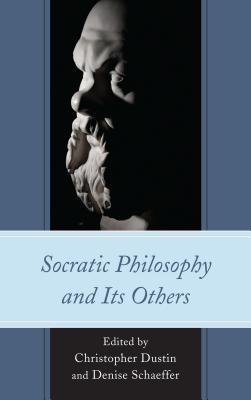The overall aim of the volume is to explore the relation of Socratic philosophizing, as Plato represents it, to those activities to which it is typically opposed. The essays address a range of figures who appear in the dialogues as distinct “others” against whom Socrates is contrasted—most obviously, the figure of the sophist, but also the tragic hero, the rhetorician, the tyrant, and the poet. Each of the individual essays shows, in a different way, that the harder one tries to disentangle Socrates’ own activity from that of its apparent opposite, the more entangled they become. Yet, it is only by taking this entanglement seriously, and exploring it fully, that the distinctive character of Socratic philosophy emerges. As a whole, the collection sheds new light on the artful ways in which Plato not only represents philosophy in relation to what it is not, but also makes it “strange” to itself. It shows how concerns that seem to be raised about the activity of philosophical questioning (from the point of view of the political community, for example) can be seen, upon closer examination, to emerge from within that very enterprise. Each of the essays then goes on to consider how Socratic philosophizing can be defined, and its virtues defended, against an attack that comes as much from within as from without. The volume includes chapters by distinguished contributors such as Catherine Zuckert, Ronna Burger, Michael Davis, Jacob Howland, and others, the majority of which were written especially for this volume. Together, they address an important theme in Plato’s dialogues that is touched upon in the literature but has never been the subject of a book-length study that traces its development across a wide range of dialogues. One virtue of the collection is that it brings together a number of prominent scholars from both political science and philosophy whose work intersects in important and revealing ways. A related virtue is that it treats more familiar dialogues (Republic, Sophist, Apology, Phaedrus) alongside some works that are less well known (Theages, Major Hippias, Minor Hippias, Charmides, and Lovers). While the volume is specialized in its topic and approach, the overarching question—about the potentially troubling implications of Socratic philosophy, and the Platonic response—should be of interest to a broad range of scholars in philosophy, political science, and classics.
The overall aim of the volume is to explore the relation of Socratic philosophizing, as Plato represents it, to those activities to which it is typically opposed. The essays address a range of figures who appear in the dialogues as distinct “others” against whom Socrates is contrasted—most obviously, the figure of the sophist, but also the tragic hero, the rhetorician, the tyrant, and the poet. Each of the individual essays shows, in a different way, that the harder one tries to disentangle Socrates’ own activity from that of its apparent opposite, the more entangled they become. Yet, it is only by taking this entanglement seriously, and exploring it fully, that the distinctive character of Socratic philosophy emerges. As a whole, the collection sheds new light on the artful ways in which Plato not only represents philosophy in relation to what it is not, but also makes it “strange” to itself. It shows how concerns that seem to be raised about the activity of philosophical questioning (from the point of view of the political community, for example) can be seen, upon closer examination, to emerge from within that very enterprise. Each of the essays then goes on to consider how Socratic philosophizing can be defined, and its virtues defended, against an attack that comes as much from within as from without. The volume includes chapters by distinguished contributors such as Catherine Zuckert, Ronna Burger, Michael Davis, Jacob Howland, and others, the majority of which were written especially for this volume. Together, they address an important theme in Plato’s dialogues that is touched upon in the literature but has never been the subject of a book-length study that traces its development across a wide range of dialogues. One virtue of the collection is that it brings together a number of prominent scholars from both political science and philosophy whose work intersects in important and revealing ways. A related virtue is that it treats more familiar dialogues (Republic, Sophist, Apology, Phaedrus) alongside some works that are less well known (Theages, Major Hippias, Minor Hippias, Charmides, and Lovers). While the volume is specialized in its topic and approach, the overarching question—about the potentially troubling implications of Socratic philosophy, and the Platonic response—should be of interest to a broad range of scholars in philosophy, political science, and classics.
Get Socratic Philosophy and Its Others by at the best price and quality guranteed only at Werezi Africa largest book ecommerce store. The book was published by Bloomsbury Publishing Plc and it has pages. Enjoy Shopping Best Offers & Deals on books Online from Werezi - Receive at your doorstep - Fast Delivery - Secure mode of Payment
 Jacket, Women
Jacket, Women
 Woolend Jacket
Woolend Jacket
 Western denim
Western denim
 Mini Dresss
Mini Dresss
 Jacket, Women
Jacket, Women
 Woolend Jacket
Woolend Jacket
 Western denim
Western denim
 Mini Dresss
Mini Dresss
 Jacket, Women
Jacket, Women
 Woolend Jacket
Woolend Jacket
 Western denim
Western denim
 Mini Dresss
Mini Dresss
 Jacket, Women
Jacket, Women
 Woolend Jacket
Woolend Jacket
 Western denim
Western denim
 Mini Dresss
Mini Dresss
 Jacket, Women
Jacket, Women
 Woolend Jacket
Woolend Jacket
 Western denim
Western denim
 Mini Dresss
Mini Dresss





































